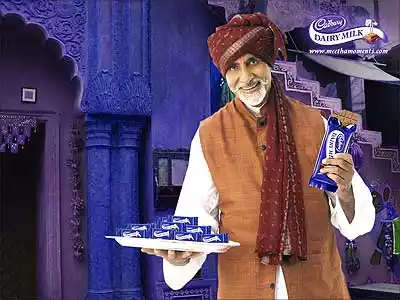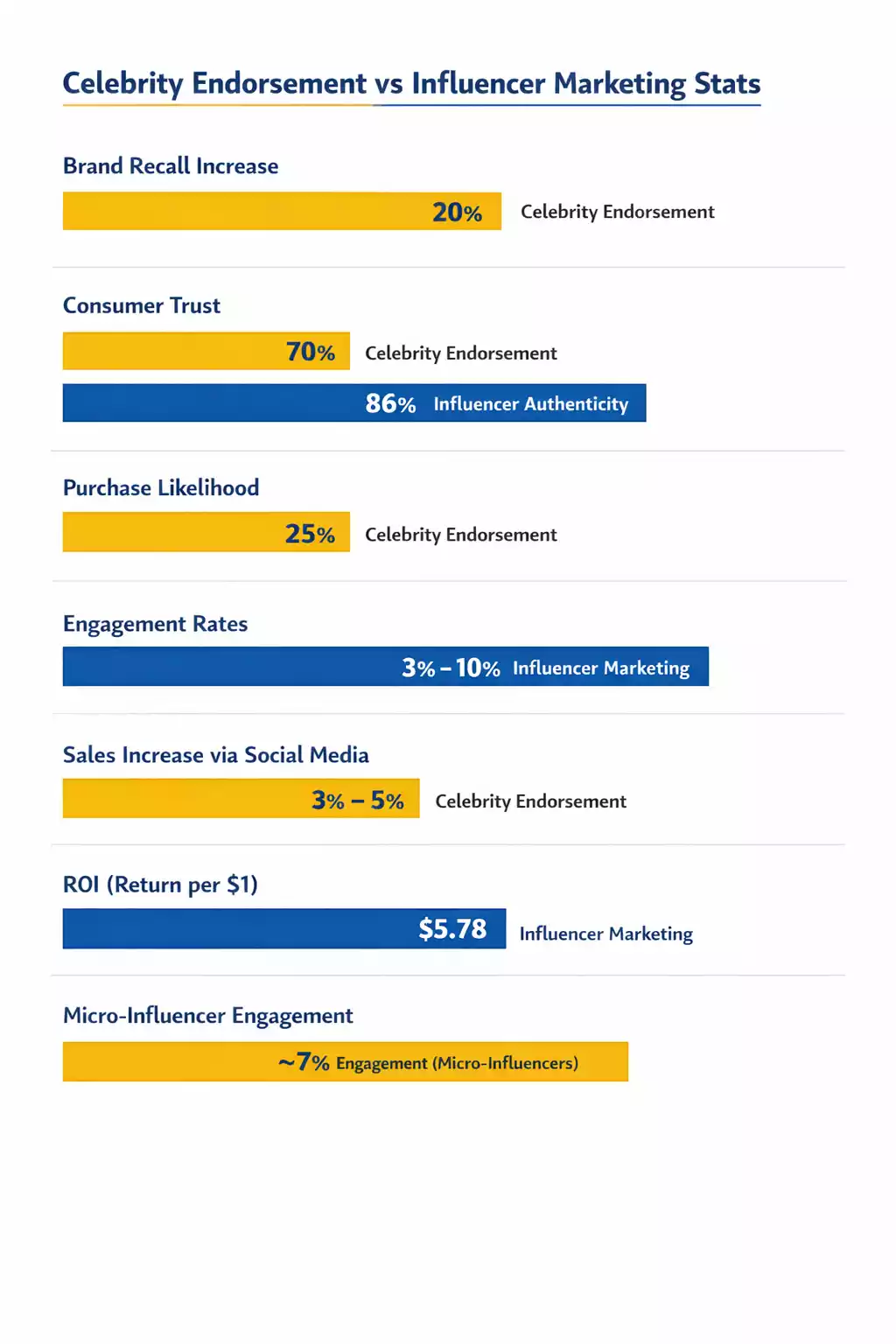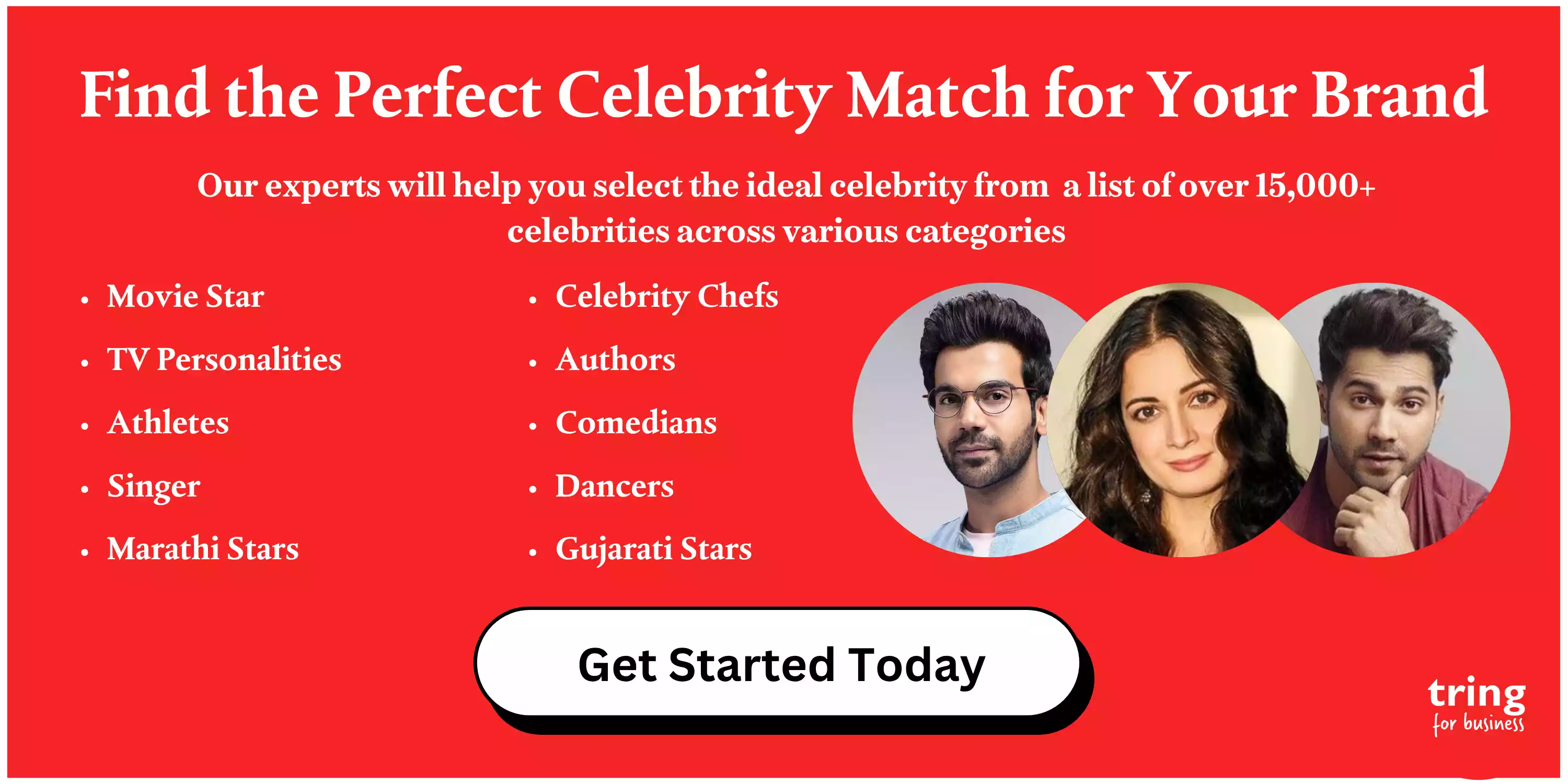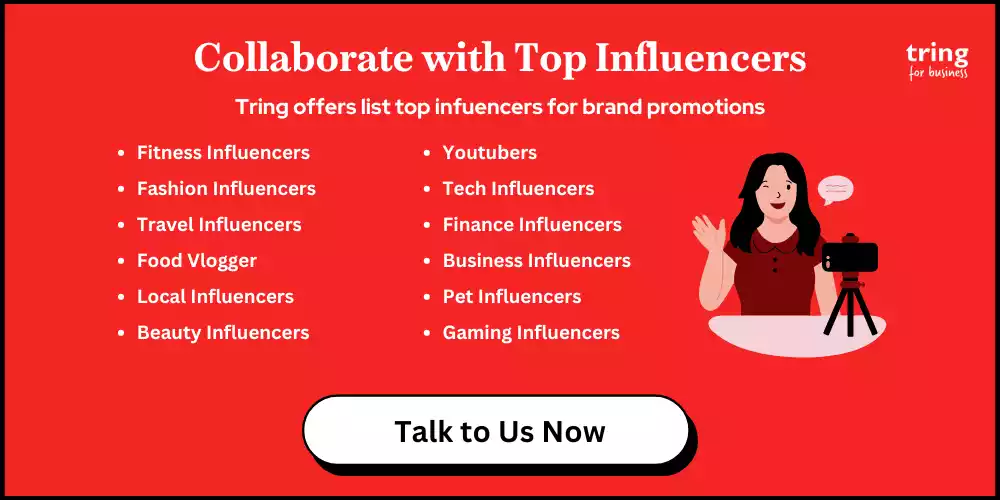Influencer marketing and celebrity endorsements are effective techniques for firms to establish trust and gain visibility. Approximately 93% of marketers have employed influencer marketing, and 89% believe it produces greater results than other strategies. People are also four times more inclined to believe a tip from an influencer or celebrity than a standard advertisement.
Celebrity endorsements can increase brand recall by up to 60% and influence purchasing decisions. Furthermore, using social media, influencers may communicate directly with their fans, making the message feel more personalised. When brands collaborate with trusted public figures, they can reach the appropriate people, strengthen their connections, and develop quicker in a congested market.
![Celebrity Endorsement vs Influencer Marketing Celebrity Endorsement vs Influencer Marketing]()
Celebrity Endorsement vs Influencer Marketing Statistics
![]()
Understanding the exact differences between celebrity endorsement and influencer marketing can help brands make informed calls about how they should approach their brand advertising strategies.
Here are some key celebrity ads vs influencer marketing statistics that highlight the effectiveness and trends in both areas:
Celebrity Endorsement Statistics:
-
Brand Recall: Research indicates that celebrity endorsements can increase brand recall by up to 20%. Consumers often remember brands more easily when associated with well-known personalities.
-
Trust Factor: Approximately 70% of consumers trust endorsements from celebrities, especially if they have a positive image and align with the brand’s values.
-
Purchase Influence: A study found that 25% of consumers are more likely to buy a product after seeing it endorsed by a celebrity. This shows the significant impact of celebrity influence on purchasing decisions.
-
Social Media Impact: Celebrity endorsements on social media can lead to a 3-5% increase in sales, particularly when celebrities engage with their followers about the products.
Influencer Marketing Statistics:
-
Engagement Rates: Influencer marketing campaigns typically see engagement rates of 3-10%, significantly higher than traditional advertising methods, which often fall below 1%.
-
ROI: Brands earn an average of $5.78 for every dollar spent on influencer marketing, demonstrating its cost-effectiveness compared to traditional advertising.
-
Authenticity: About 86% of consumers say that authenticity is a key factor when deciding which brands to support. Influencers, often seen as relatable and genuine, can foster this sense of trust.
-
Preference for Micro-Influencers: Micro-influencers (those with 1,000 to 100,000 followers) often have higher engagement rates (around 7%) compared to larger influencers, making them a preferred choice for many brands.
-
Diverse Platforms: Over 80% of marketers find Instagram to be the most effective platform for influencer marketing, followed by YouTube (55%) and TikTok (23%), highlighting the shifting landscape of social media engagement.
Celebrity endorsements and influencer marketing both have cemented their place in modern advertising. Celebrities can quickly boost brand recognition, while influencers often build stronger and more personal connections with their audience. The right choice depends on who you’re trying to reach and what your goals are. In some cases, using both can work well. Take a look at the stats around celebrity ads and influencer marketing before deciding which path makes the most sense for your brand.
Promote Your Brand With Famous Celebrities & Influencers!
![]()
Difference Between Celebrity Endorsement and Influencer Marketing
While celebrity endorsement and influencer marketing share similarities in making use of famous personalities to promote products, they differ in their approaches, audience engagement, and overall impact.
|
Aspect
|
Celebrity Endorsement
|
Influencer Marketing
|
|
Definition
|
Involves well-known celebrities promoting a brand or product.
|
Involves individuals with a strong online presence promoting products to their followers.
|
|
Audience Reach
|
Typically has a broad reach, appealing to a wide audience.
|
Often targets niche audiences with specific interests or demographics.
|
|
Cost
|
Generally more expensive due to the celebrity's fame.
|
Usually more cost-effective, especially with micro-influencers.
|
|
Authenticity
|
Can be perceived as less authentic if the endorsement feels forced.
|
Often seen as more authentic and relatable by followers.
|
|
Content Style
|
Often involves polished advertisements and formal campaigns.
|
Typically features casual, personal content that resonates more with followers.
|
|
Engagement Level
|
Limited interaction; primarily one-way communication.
|
High interaction; fosters two-way communication and engagement.
|
|
Longevity
|
Campaigns are often short-term, tied to specific promotions.
|
Influencer partnerships can be long-term, building ongoing relationships.
|
|
Platform Focus
|
Primarily traditional media (TV, print) and major social media.
|
Predominantly social media platforms (Instagram, Facebook, YouTube).
|
By understanding these key differences between influencer vs celebrity marketing, brands can effectively navigate their marketing strategies to achieve targeted outcomes.
Importance of Celebrity Endorsements and Influencer Marketing
Both celebrity endorsements and influencer marketing use personality and public perception to create a strong connection between consumers and brands. Understanding the importance of each can help brands tailor their marketing efforts effectively.
Importance and Benefits of Celebrity Endorsements
Check out the top 5 benefits of celebrity endorsements that brands can make use of. Understand why brands should consider using celebrities to endorse their products or services!
1. Amplifying Brand Visibility
Celebrity endorsements play a crucial role in amplifying a brand's visibility. Celebrities have an extensive reach, allowing brands to tap into their vast networks and audiences. When a celebrity endorses a product, it often attracts significant media attention which leads to an increase in exposure for the brand across various platforms. This visibility is vital in a crowded marketplace, where standing out is essential for getting more potential customers.
2. Establishing Credibility
The association with a credible celebrity can lend legitimacy to a brand. Consumers are more likely to trust a product that has been endorsed by a highly respected figure, especially if that celebrity aligns with the brand’s values. This credibility is particularly important in industries such as health, beauty, and technology, where consumers often seek validation before making a purchase. A celebrity endorsement can serve as a form of social proof and reinforce the idea that the product is of high quality.
3. Creating Aspirational Connections
Celebrities often portray aspirational qualities that consumers admire such as success, talent, and charisma. By endorsing a brand, they create an emotional connection that encourages consumers to associate those positive attributes with the product. This aspirational aspect is particularly effective in lifestyle and luxury brands, where the desire to mimic a celebrity can drive consumer behavior. The emotional connection of celebrity endorsements can motivate consumers to choose one brand over another simply due to the influence of the celebrity’s image.
4. Facilitating Market Penetration
When entering new markets, brands can use celebrity endorsements to facilitate market penetration. A well-known celebrity from a specific region or demographic can help a brand establish a foothold in that market by appealing to local consumers. This localized approach can be instrumental in building brand recognition and trust in new territories, where consumers may be unfamiliar with the brand.
5. Enhancing Brand Storytelling
Celebrities can significantly enhance a brand's storytelling efforts. By weaving a celebrity’s narrative into the brand's messaging, companies can create compelling stories that resonate with consumers. This storytelling aspect helps to humanize the brand, making it more relatable and engaging. When a celebrity shares their personal experience with a product, it adds depth to the brand’s narrative, nurturing a stronger connection with the audience.
Importance and Benefits of Influencer Marketing
Want to know why is influencer marketing effective for brands looking to expand their market reach and grow as a business or a company? Discover the benefits of influencer marketing to broaden your brand's reach and strengthen its reputation.
1. Targeted Audience Engagement
Influencer marketing excels in engaging targeted audiences. Influencers often have niche followings that share specific interests or demographics, allowing brands to connect with a highly relevant audience. This targeted approach ensures that marketing messages are delivered to consumers who are more likely to be interested in the products, enhancing the effectiveness of campaigns.
2. Building Authentic Relationships
The relationship between influencers and their followers is often built on authenticity and trust. Influencers are perceived as relatable figures who share genuine content about their lives and experiences. This authenticity is crucial in today’s market, where consumers increasingly seek real connections with brands. By partnering with influencers, brands can tap into these established relationships, fostering a sense of trust and loyalty among consumers.
3. Driving Social Conversations
Influencers play a vital role in driving social conversations around brands and products. Their ability to engage followers through discussions, reviews, and recommendations can create buzz and generate interest. This conversational aspect is particularly important in a digital age where word-of-mouth marketing is amplified through social media. Brands can benefit from the organic discussions that arise from influencer partnerships, leading to increased awareness and interest.
4. Adapting to Trends and Changes
The digital marketing landscape is constantly evolving, and influencers are often at the forefront of these changes. They have their fingers on the pulse of emerging trends, allowing brands to stay relevant and adaptable. By collaborating with influencers who are attuned to the latest developments in consumer behaviour and preferences, brands can ensure their marketing strategies align with current trends, enhancing their effectiveness.
5. Creating Diverse Content
Influencers bring creativity and innovation to content creation, which is vital for brands seeking to capture consumer attention. They often produce high-quality, engaging content that resonates with their followers. This diverse content can take various forms, including videos, blog posts, and social media stories, allowing brands to reach consumers through multiple channels. The ability to create fresh and compelling content is essential in maintaining consumer interest and engagement.
The importance of celebrity endorsements and influencer marketing cannot be overstated in today’s competitive marketplace. Brands that effectively harness the strengths of both celebrity endorsements and influencer marketing are likely to achieve greater success in connecting with consumers and driving growth.
Celebrity Endorsement vs Influencer Marketing: What is Better in India?
In India’s vibrant and diverse market, brands constantly seek effective strategies to reach consumers and drive sales. Two prominent approaches are celebrity endorsement and influencer marketing. Both methods have their unique strengths and can significantly impact a brand’s success. However, determining which is better in the Indian context requires an understanding of cultural nuances, consumer behaviour, and market dynamics.
Let's understand celebrity endorsement vs influencer in India to determine what is better for your business!
The Appeal of Celebrity Endorsement
Celebrity endorsement has long been a staple in Indian advertising. The country boasts a rich history of celebrities, from film stars to sports icons, whose influence can be profound. For brands, associating with a well-known figure like Bollywood actors or cricket stars can lead to instant recognition and credibility.
Advantages:
-
Widespread Reach: Celebrities often have a massive following, which can translate into extensive brand visibility. A single advertisement featuring a popular star can reach millions through television, print, and digital platforms.
-
Instant Credibility: Consumers are likely to trust products endorsed by well-respected figures. This can be particularly effective in sectors like beauty, health, and consumer goods, where brand loyalty is crucial.
-
Aspirational Marketing: Celebrities embody aspirational qualities that resonate with consumers, encouraging them to associate the brand with a desired lifestyle.
However, celebrity endorsements can be expensive and may not always guarantee engagement or authenticity, especially if the endorsement feels forced or disconnected from the celebrity’s image.
Are You Looking to Promote Your Brand by Celebrity Endorsements?
![]()
The Rise of Influencer Marketing
In recent years, influencer marketing has gained significant traction in India, particularly among younger consumers. With the rise of social media platforms like Instagram, YouTube, and Facebook, influencers have carved out niches in various sectors, from fashion to technology.
Advantages:
-
Targeted Engagement: Influencers often cater to specific demographics or interests, allowing brands to connect with niche audiences more effectively. This targeted approach can lead to higher engagement rates.
-
Authenticity and Relatability: Influencers typically share relatable content that resonates with their followers. Their endorsements feel more genuine, fostering trust and loyalty among consumers.
-
Cost-Effectiveness: Collaborating with micro and mid-tier influencers can be more budget-friendly compared to high-profile celebrities, making it accessible for brands of all sizes.
Are You Looking to Promote Your Brand by Influencer Marketing?![Promote Your Brand by Influencer Marketing Promote Your Brand by Influencer Marketing]()
Which is Better?
Determining whether celebrity endorsement or influencer marketing is better in India largely depends on the brand’s objectives, target audience, and budget.
-
For Mass Appeal: If a brand aims for widespread recognition and immediate credibility, celebrity endorsements may be the way to go. The ability to use a celebrity’s established reputation can provide a significant boost, especially in traditional sectors like FMCG and entertainment.
-
For Targeted Campaigns: Conversely, if the goal is to engage a specific audience or foster a community around a brand, influencer marketing may be more effective. Influencers can create authentic connections and drive conversations that resonate deeply with their followers.
The choice between influencer marketing vs celebrity endorsement should be guided by the brand’s goals, the nature of the product, and the target audience. Many brands are now opting for a hybrid approach, combining the broad reach of celebrity endorsements with the authenticity of influencer marketing. This strategy can maximize impact and effectively use the strengths of both methods, ensuring that brands resonate with consumers in a rapidly evolving market.
Challenges of Celebrity Endorsement and Influencer Marketing
While celebrity endorsement and influencer marketing offer significant benefits to brands, they also come with their own set of challenges. Understanding these challenges is crucial for brands looking to maximize the effectiveness of their marketing strategies. Here, we explore some common challenges associated with each approach and propose potential solutions.
Challenges of Celebrity Endorsement
1. High Costs
Challenge: Engaging a top celebrity can be prohibitively expensive for many brands, especially smaller companies or startups. The financial investment may not always translate into proportional returns.
Solution: Brands can consider collaborating with emerging celebrities or regional stars who may be more affordable yet still possess significant influence. Alternatively, brands can focus on negotiation strategies that allow for performance-based compensation, tying the celebrity's fees to sales performance.
2. Risk of Negative Publicity
Challenge: Celebrities are often in the public eye, and any negative behaviour or scandal can adversely affect the brand they represent. This risk can lead to a loss of consumer trust and brand reputation.
Solution: Brands should conduct thorough background checks and monitor celebrities’ public behavior before entering agreements. Including clauses in contracts that allow brands to terminate endorsements in case of negative publicity can also provide a safeguard. Because there is a huge impact of celebrity endorsement on brand image, we advise you to choose a celebrity wisely or let us help you to find a suitable one for your brand.
3. Authenticity Issues
Challenge: Consumers may perceive celebrity endorsements as insincere, especially if the celebrity does not genuinely use or believe in the product. This can lead to scepticism and reduced effectiveness.
Solution: Brands should choose celebrities whose values align with the brand’s mission and who have a genuine connection to the product. Authentic storytelling that showcases the celebrity’s real experience with the product can enhance credibility.
Challenges of Influencer Marketing
1. Finding the Right Influencer
Challenge: With thousands of influencers across various platforms, identifying the right fit for a brand can be overwhelming. The wrong choice can lead to ineffective campaigns and wasted resources.
Solution: Brands should use data analytics and audience insights to select influencers whose demographics align with their target market. Tools and platforms that specialize in influencer marketing can simplify this process by providing metrics on engagement, reach, and audience demographics.
2. Managing Relationships
Challenge: Building and maintaining relationships with influencers can be challenging, especially when dealing with multiple partners. Miscommunication can lead to misaligned expectations and unsatisfactory outcomes.
Solution: Establishing clear communication channels and setting specific expectations from the outset can help mitigate these issues. Regular check-ins and feedback sessions can also foster strong relationships and ensure that both parties are aligned on campaign goals.
3. Measuring ROI
Challenge: Measuring the return on investment (ROI) for influencer marketing can be complex. Unlike traditional advertising, the impact of influencer marketing campaigns is often difficult to quantify.
Solution: Brands should establish key performance indicators (KPIs) before launching campaigns. Metrics such as engagement rates, conversion rates, and overall sales can provide insights into campaign effectiveness. Utilizing tracking links and unique discount codes can also help quantify sales generated through influencer partnerships.
Both celebrity endorsements and influencer marketing present unique challenges that require careful consideration and strategic planning. By understanding these challenges and implementing effective solutions, brands can enhance their marketing efforts and ensure that their campaigns resonate with their target audiences.
Secure Your Brand a Celebrity Endorsement or Influencer Marketing Deal!
Ready to boost your brand's visibility with a celebrity endorsement or influencer marketing deal? We will connect you directly with the perfect celebrity or influencer to match your brand’s values and goals.
Secure your brand’s next celebrity endorsement deal today & see an exponential surge in sales!
![]()
![birthday occasion]() Birthday Gifts
Birthday Gifts
![anniversary occasion]() Anniversary Gifts
Anniversary Gifts
![women]() Women
Women
![men]() Men
Men
![Couples]() Couples
Couples
![Couples]() Wedding Gifts
Wedding Gifts

 Birthday Gifts
Birthday Gifts
 Women
Women
 Men
Men
 Anniversary Gifts
Anniversary Gifts
 Wedding Gifts
Wedding Gifts





 We now support international payments
We now support international payments
